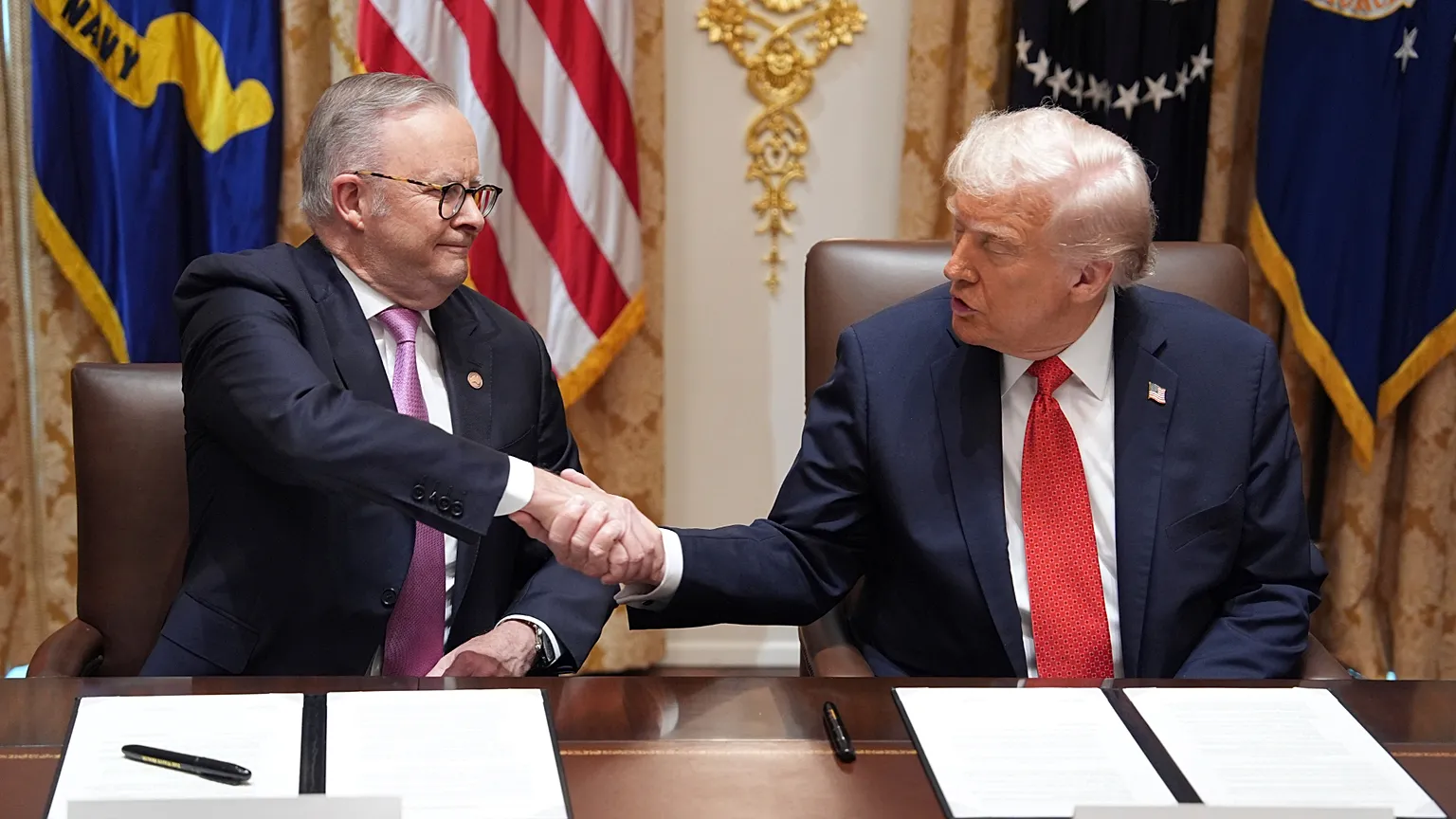Alwaght- On the world arena, the policy of the big powers in dealing with other countries has always been driven by specific reservations. Their loyal allies gain access to cutting-edge technology and benefits, while independent and critical nations face severe restrictions and pressure. The US is a top example of a country holding this approach, having demonstrated a stark contrast in how it treats allied and non-compliant governments over the past eight decades.
The latest example of this contradictory approach can be seen in the US President Donald Trump's meeting with Australian Prime Minister Anthony Albanese on Monday. The two signed a worth $8.5 billion deal for supply of Australian minerals to the US to counter China. The two countries are also slated to invest $2.2 billion in mining projects of Australia.
During the visit, Australia also won Trump's support for its plan to develop nuclear-powered submarines under the AUKUS (Australia-UK-US) security pact, a 2021 initiative designed to secure their interests in the Indo-Pacific region.
The agreement, signed under Biden and valued at an estimated 368 billion Australian dollars ($239 billion), paves the way for Australia to acquire US nuclear-powered submarines by 2032. The pact also includes a collaborative effort with Britain to jointly build a new generation of submarines.
Warmongering in Asia-Pacific
Trump has repeatedly claimed himself to be the proponent of peace in the world and says he has managed to end 8 regional wars since he took office in 2024. However, his policies speak against his claims. Washington's military aid and nuclear weapons technology not only fail to enhance its allies' security, but also indirectly fan the flames of conflict with its rivals. A clear example of this policy is equipping Australia with nuclear-powered submarines, a move announced as a counter to the growing power of China, the US' primary emerging rival in Asia and the Pacific.
Washington's focus on strengthening security and military cooperation with its allies in the Asia-Pacific region in recent years naturally inflames tension and competition with Beijing. Therefore, the AUKUS pact and the provision of nuclear submarines and other modern arms to Australia will not bring peace and security. On the contrary, it could trigger new crises similar to that of Ukraine, but this time with the risk of nuclear conflict. Consequently, the intensified military and arms race resulting from this agreement threatens regional stability and increases the likelihood of large-scale conflict and unpredictable consequences.
West's double standards
The aforementioned deal shows that in the eyes of the American officials, the allies and close partners of this country can acquire various weapons and develop their nuclear programs without any limits, while countries with independent approach and policy non-compliant with those of Washington face massive obstacles to block their power gain in these vital areas of knowledge and technology.
It is precisely these contradictory standards that Iran's Supreme Leader Sayyed Ali Khamenei, recently addressed. He stated that the nuclear industry is an purely domestic matter, declaring, "what business is it of America whether Iran has nuclear capabilities and technology or not? This interference is wrong and bullying, and it will not affect the Iranian nation."
A comparison of the US approach to Australia and its aggressive policy toward Iran reveals that Washington categorizes nations as "allies" or "adversaries." Under this framework, nuclear weapons for allies are defined as guardians of international peace, while peaceful nuclear knowledge for others is labeled a global threat.
Iran's peaceful nuclear program is a case in point. As an independent and non-compliant nation, Iran has faced immense obstacles. Washington insists the Islamic Republic must halt all nuclear activities, despite their peaceful nature and compliance with international law.
This American bullying against Tehran stands in stark contrast to its policy toward other actors in West Asia. Not only does Washington refrain from imposing restrictions, but it actively insists on assisting its allies with their nuclear ambitions.
For example, in April 2024, Washington and Riyadh announced they were finalizing an agreement to develop Saudi Arabia's peaceful nuclear program. This cooperation includes building nuclear power plants and providing Saudi Arabia with access to US nuclear technology. Furthermore, last September, the US and Turkey signed an MoU for nuclear cooperation, including funding for projects involving small modular reactors (SMRs).
Moreover, Washington maintains a deliberate silence regarding the nuclear weapons program of the Israeli regime, which poses a serious threat to peace and stability in West Asia, and imposes no restrictions on it. This approach starkly exposes the lack of sincerity in Washington's claims about upholding international peace and security, revealing a clear double standard in its dealings with submissive allies against independent rivals.
Iran's approach inspiring other countries
As clearly seen in the growing gaps of the Eastern and Western powers at the UN Security Council, Iran's rational and principled standings about right of all nations for use of peace nuclear energy and technology, without any need for submission to the bullying and pressure of the powers, is everyday gaining weight and acceptance.
Iran's policy rests on the principle that nuclear energy development is a certain right of all countries and no others have the right to limit the path of advances in this technology using pressure or threat. On the opposite side stand the double standards of the West in dealing with Iran's nuclear program that, unwittingly, boost the credibility and popularity of the Iranian approach on the world stage.
This approach is inspiring other regional and international countries to pursue their nuclear programs independently and peacefully, something demonstrating that dictated and imposed policies by the White House and its allies are no longer able to put the brakes on development and self-sufficiency of regional nations in civil, and even military, nuclear technology.
In other words, through its rational resistance and defending right of other nations, Tehran has presented a successful model that neutralizes Western pressures and restrictions and prepares the ground for cooperation on scientific and technological development.



























